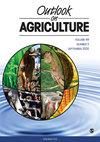Maize seed aid and seed systems development: Opportunities for synergies in Uganda
IF 2.6
3区 经济学
Q1 AGRICULTURE, MULTIDISCIPLINARY
引用次数: 0
Abstract
In the name of food security, governments and NGOs purchase large volumes of maize seed in non-relief situations to provide at reduced or no cost to producers. At the same time, efforts to build formal maize seed systems have been frustrated by slow turnover rates – the dominance of older seed products in the market over newer, higher performing ones. Under certain conditions, governments and NGO seed aid purchases can support formal seed systems development in three ways: i) support increased producer awareness of new products, ii) support local private seed industry development, and iii) advance equity goals by targeting aid to the most vulnerable of producers who lack the capacity to purchase seeds. This study explores the objectives and activities of seed aid programmes in Uganda and their interactions with the maize seed sector. We draw insights from interviews with representatives of seed companies, NGOs and government agencies, as well as focus group discussions with producers. The findings indicated that seed aid programme objectives are largely disconnected from broader seed systems development goals. There is little evidence of public-private collaboration in design of these programmes. Better designed programs have the potential to align with varietal turnover objectives, commercial sector development and targeting of underserved markets could promote equity and ‘crowd in’ demand.玉米种子援助和种子系统开发:乌干达的协同机会
政府和非政府组织以粮食安全为名,在非救济情况下购买大量玉米种子,以降低成本或免费提供给生产者。与此同时,建立正规玉米种子系统的努力却因周转率缓慢而受挫,即市场上老种子产品比性能较好的新种子产品占据主导地位。在某些条件下,政府和非政府组织购买种子援助可以通过三种方式支持正规种子系统的发展:i) 支持提高生产者对新产品的认识;ii) 支持当地私营种子行业的发展;iii) 通过向缺乏购买种子能力的最弱势生产者提供援助来推进公平目标的实现。本研究探讨了乌干达种子援助计划的目标和活动及其与玉米种子行业的互动。我们从与种子公司、非政府组织和政府机构代表的访谈以及与生产者的焦点小组讨论中汲取了深刻的见解。调查结果表明,种子援助计划的目标在很大程度上与更广泛的种子系统发展目标脱节。在设计这些计划时,很少有公私合作的迹象。设计得更好的计划有可能与品种更替目标、商业部门发展以及针对服务不足的市场保持一致,从而促进公平并 "吸引 "需求。
本文章由计算机程序翻译,如有差异,请以英文原文为准。
求助全文
约1分钟内获得全文
求助全文
来源期刊

Outlook on Agriculture
农林科学-农业综合
CiteScore
5.60
自引率
13.30%
发文量
38
审稿时长
>36 weeks
期刊介绍:
Outlook on Agriculture is a peer reviewed journal, published quarterly, which welcomes original research papers, research notes, invited reviews and commentary for an international and interdisciplinary readership. Special attention is paid to agricultural policy, international trade in the agricultural sector, strategic developments in food production, the links between agricultural systems and food security, the role of agriculture in social and economic development, agriculture in developing countries and environmental issues, including natural resources for agriculture and climate impacts.
 求助内容:
求助内容: 应助结果提醒方式:
应助结果提醒方式:


